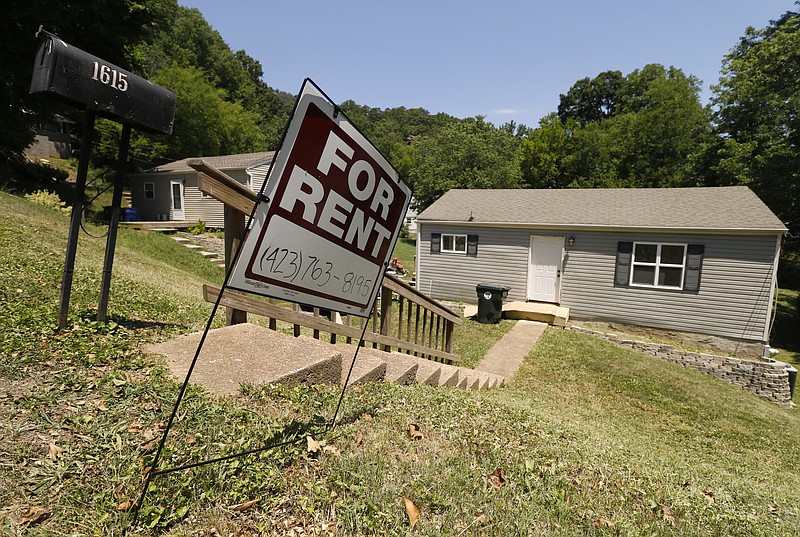Rental rates in Chattanooga have grown in the past 25 years at only a third of the U.S. rate of increase, but the costs of renting a typical home or apartment in the Chattanooga area have still far outstripped income gains in the same period.
A new study by Apartment List estimates that inflation-adjusted rents in Chattanooga rose 21 percent from 1980 when the average rent was $635 to 2014 when the median rent was $768 per home or apartment. In comparison, inflation-adjusted household incomes in Chattanooga increased by only 7 percent to $53,013.
Rental rates continue to rise as Chattanooga's population and employment grow and many Chattanooga area residents opt to rent, rather than own, their homes. Many Millennials are delaying their first-time home purchases due to higher student debt, less ability to make down payments and more mobility. At the same time, many empty nesters are moving from homes to apartments to live closer to downtown or simply to downsize from bigger, more expensive homes.
Rising rental rates in Chattanooga are helping boost real estate developers and investors. More than 3,000 apartment units are either under construction or on the drawing board in Hamilton County.
But the increase in local rental rates is also squeezing household budgets, especially for many low-income families.
"The rental market is very strong right now so we're seeing more interest among investors in all types of rental properties," said Nathan Walldorf, president of the Greater Chattanooga Association of Realtors.
Housing and apartment construction lagged during the Great Recession and its aftermath. But with the addition of more than 9,000 jobs in metropolitan Chattanooga during the past year, combined with the continued growth of both local colleges and retirement facilities, more workers, students and retirees are moving to Chattanooga.
"Chattanooga has always been a pretty consistent rental market, but we're seeing more increases in rental rates at renewal time than we did a few years ago during the downturn," said Robyn Ring, principal with OVERSET FOLLOWS:River City Property Management - one of the largest rental management companies in Chattanooga.
In the 6-county Chattanooga metropolitan area, 34 percent of all households are renters, according to the U.S. Bureau of Census.
In another study released last month, the National Low Income Housing Coalition estimates a full-time worker in Chattanooga must earn at least $11.85 an hour to afford a typical one-bedroom apartment with an average monthly lease rate of $616 to keep housing expenses below the recommended 30 percent of an individual's income. To afford a typical two-bedroom apartment, a worker would need an hourly wage of at least $14.75 an hour for the average rent of $767 or a two-bedroom apartment.
"Chattanooga's working families cannot find the affordable housing they need, and something must be done about it," wrote leaders of Chattanooga Organized for Action in a report presented to the Chattanooga City Council last year that pleaded for an affordable housing plan.
A worker earning the federal minimum wage of $7.25 per hour would need to work two full-time jobs, or approximately 81.4 hours per week for all 52 weeks of the year, in order to afford a two-bedroom apartment.
"The housing situation for extremely low-income households is especially dire," said Diane Yentel, president and CEO of National Low Income Housing Coalition. "We face an alarming and increasing gap between the housing needs of our nation's lowest income households and what is affordable and available to them."
Nationwide, Apartment List estimates inflation-adjusted rents have risen by 64 percent since 1980, but real household incomes only increased by 19 percent.The study said the share of cost-burdened renters who must pay more than 30 percent of their income for housing expenses has risen from 24 percent in 1980 to 49 percent today.
"Housing markets are inherently local, and our analysis suggests that there are multiple approaches that can help struggling renters," said Andrew Woo, an analyst for Apartment List in San Francisco. "Cities like Las Vegas and Phoenix kept prices moderate by adding housing inventory, whereas Austin balanced high rent growth with strong employment and wage increases. Housing affordability is affected by both rental prices and incomes; our data suggests that cities on the coast could do more to increase rental supply, while parts of the South and Midwest need stronger wage growth."
Contact Dave Flessner at dflessner@timesfreepress.com or 423-757-6340.
